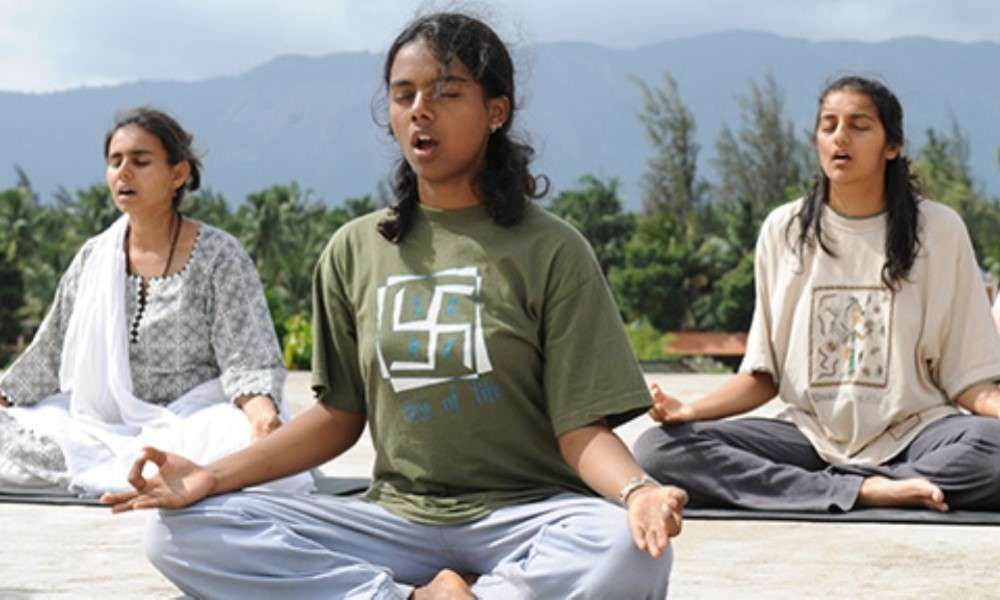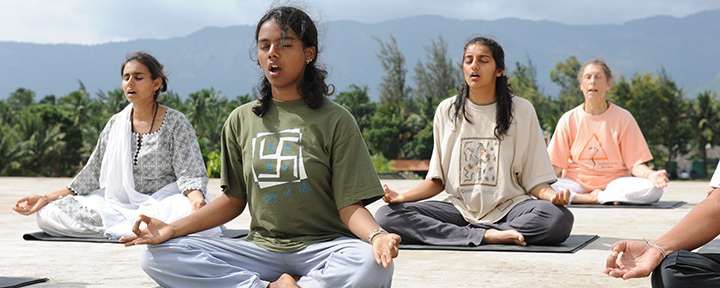AUM Chanting for the Thirsty
A new study from the Lady Irwin College, New Delhi, found an increased awareness of the body’s hydration levels in athletes practicing Isha’s AUMkar meditation. Conducted during a two-month period in 2011, the work is a part of ongoing research in clinical and sports nutrition by Dr.Priti Rishi Lal and will be presented at the International Conference on Food Studies to be held in October, in Illinois, USA.

A new study from the Lady Irwin College, New Delhi, found an increased awareness of the body’s hydration levels in athletes practicing Isha’s AUMkar meditation. Conducted during a two-month period in 2011, the work is a part of ongoing research in clinical and sports nutrition by Dr.Priti Rishi Lal and will be presented at the International Conference on Food Studies to be held in October, in Illinois, USA. The study, also published in Ms. Aanchal Aggarwal’s Master’s thesis, focused on improving water-drinking habits of young, male hockey players training with the Sports Authority of India as a part of its “Come and Play” scheme.
Why AUMkar?
Ms. Aggarwal and Dr. Lal found that despite educating athletes on the need to drink adequate water during play, most players still suffered from dehydration during the game, leading to reduced performance and physical capabilities, as well as significant long-term health problems.

Dr. Lal says, “The players had already been educated on the body’s water needs. They had been given information as well as experiential learning through demos. In fact, when we gave them a basic test on their knowledge of body hydration, most of them scored 100%. They knew what they should do, but they were just not doing it. There was some connection needed between knowledge and actual change in behaviour. A conscious awareness of the body’s thirst level was needed.” Was AUMkar the answer?
Research has already explored the physiological and psychological benefits of AUM meditation. Ms.Aggarwal and Dr.Lal make a distinction between how AUMkar meditation is offered at Isha as compared to elsewhere. “While a recent Indian study described AUM as a monosyllable (OM), . . . Isha Foundation offers it as a tri-syllable,” says Ms.Aggarwal. Referring to studies conducted on the positive effects of Shambhavi Mahamudra, she continues, “Yogic practices containing AUM have been recently reported to improve brain function.” This is one of the reasons why the researchers chose AUMkar meditation as a tool for “bridging the gap between knowledge and behaviour,” in their body hydration study.
Subscribe
During the experimental study, 30 players were divided randomly into two groups: a control group – who received the already existing education module on adequate water consumption – and an experimental group – who received the education module, and practiced a brief session of AUMkar meditation for 21 minutes every day for 21 days. At the end of the 21-day period, tests showed that after the game, players practicing AUMkar had significantly healthier water levels compared to the control group. This also translated into better performance at tests measuring heart rate and physical agility. The players also reported feeling happier, calmer and more focused.

“Many of the participants came up to me and shared that apart from their game performance, they were also experiencing other benefits. One of the participants told me that he was getting along better with everyone at home. They seem to have matured a lot during this study. This study has opened up a whole gamut of possibilities. We have already got two more studies planned to find out more on the benefits of the meditations that Isha offers,” says Dr. Lal.
Isha Foundation also offers Isha Kriya, a free online meditation. Try it out here
Editor’s Note: Excerpted from Sadhguru’s discourse at the Isha Hatha Yoga School’s 21-week Hatha Yoga Teacher Training program. The program offers an unparalleled opportunity to acquire a profound understanding of the yogic system and the proficiency to teach Hatha Yoga. The next 21-week session begins on July 16 to Dec 11, 2019. For more information, visit www.ishahathayoga.com or mail info@ishahatayoga.com



